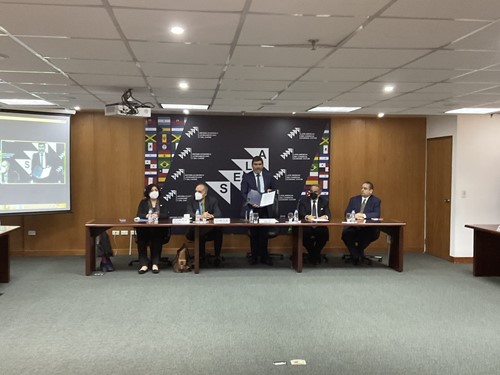
The Latin American and Caribbean Economic System (SELA) and the International Regional Organization for Plant and Animal Health (OIRSA) signed on Tuesday in Caracas a framework agreement for specialized phytosanitary advice in the respective Member States, through strategic actions aimed at improving, sustaining and strengthening the fight against insect pests in order to guarantee food security in the region.
The Permanent Secretary of SELA, Ambassador Clarems Endara, explained that this strategic cooperation alliance will allow providing the Member States with specialized technical advice for the correct management of pests through solutions in line with the reality of the region, which requires the participation of different sectors, given the importance of agriculture for food security and its impact on the economy.
“The phytosanitary management of agriculture is necessary as a means to achieve the quantity and quality of food required for the more than 400 million inhabitants of Latin America and the Caribbean. At SELA, as a coordinating, enabling and proactive organization, we are committed to work towards achieving a more and better integrated region. That is why we join the lines of action that contribute to overcoming the existing crisis and strengthen the capacities of our region,” he said.
The Executive Director of OIRSA, Efrain Medina, highlighted the economic impact of the pandemic and its effects on food security in Latin America and the Caribbean, especially in impoverished sectors. “This strategic alliance between countries is undoubtedly essential to face the great challenges that we are currently experiencing, especially after the economic impact of the pandemic.”
Carlos Uria, Regional Director of OIRSA, also considers the participation of the private sector to be essential within the framework of international cooperation for phytosanitary security in the region. “The public sector organises and coordinates, while international organisations support and advise, but the private sector is essential to define impact actions,” he said.
Plant pests and diseases cause 40% of food crop losses; the damage they cause to agriculture and food production exacerbates world hunger and threatens food security.
In Central America, for example, outbreaks of the ‘flying locust’ attack staple grain crops and some 400 plant species. There is also the Fusarium R4T fungus, which has a particular impact on banana crops and is present in at least three Latin American countries. There is also the case of the so-called ‘Witches’ Broom,’ an aggressive fungus that can kill the cocoa plant and wipe out entire farms.
During the signing of the framework agreement between SELA and OIRSA, authorities of the Inter-American Institute for Cooperation on Agriculture (IICA), the People’s Ministry for Productive Agriculture and Lands (MPPAPT), the National Institute for Comprehensive Agricultural Health (INSAI), the National Institute for Agricultural Research (INIA), as well as the Venezuelan Foreign Ministry participated. Private sector companies such as ‘Alimentos La Giralda,’ ‘Nestle’ and ‘Cacao San José,’ among others, were also present.
